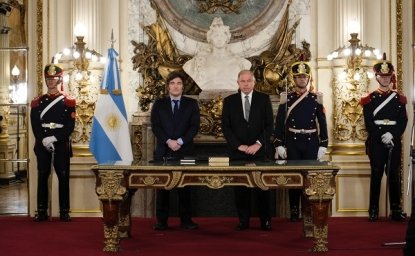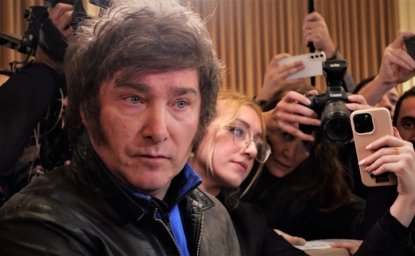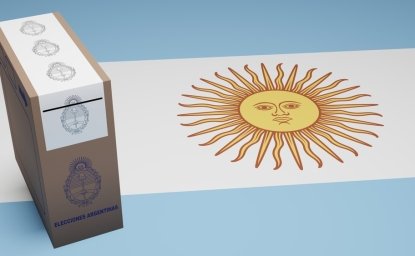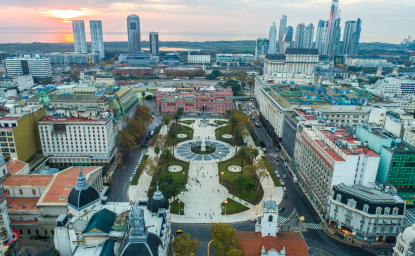English | Español
By Sebastián Fest
Few figures generate more division and debate in Argentina than Cristina Fernández de Kirchner, but there is one thing everyone should agree on: the former president is a political science pioneer. She is also skilled at managing political campaigns. Thanks to her, Peronism is poised to recoup its power.
A political science pioneer? Well, after all, there is no precedent for a former president nominating herself for the vice presidency, and then designating her party’s presidential candidate. But that is exactly what happened on a Saturday in May earlier this year, when Ms. Fernández de Kirchner shook the foundations of Argentina’s political world in a 9 a.m. video announcing she would settle for the number-two spot and “cede” the presidency to Alberto Fernández, a politician with plenty of experience in power but almost none as a candidate. A politician, moreover, with a record of serious criticism of Ms. Fernández de Kirchner. (Just one example: “Peronism was pathetic under Cristina.”)
There had to be good reasons for Ms. Fernández de Kirchner, 66, to swallow her pride and choose someone who in 2008 had resigned as her cabinet chief. One of them, without a doubt, is what has been repeated frequently in recent months by spokesmen for “albertismo” (in Argentina, political parties have less and less influence compared to individual leaders and their cliques): Without Cristina, winning is impossible, but Cristina alone is not enough.
Thus the “strategy of the forgotten memory.” For many Argentines, Ms. Fernández de Kirchner is either a good or great memory: the Peronists have to protect and motivate these voters. For many others, however, Ms. Fernández de Kirchner is a bad or horrible memory: the Peronists have to neutralize these voters, and for that reason, Ms. Fernández de Kirchner’s campaign largely involves her absence.
She keeps her distance from Alberto Fernández, with separate campaign events and solo trips to the provinces, cities and neighborhoods where she is most popular. Meanwhile, she avoids anywhere where she is disliked.
The goal is to avoid mobilizing her opponents and, whenever possible, discouraging them. Ms. Fernández de Kirchner irritates a lot of people, but if her voice is a distance echo, there is less risk of energizing “anticristinismo.”
It turns out, Ms. Fernández de Kirchner is a good solider: Now and then she says something controversial – like when she said hunger in Argentina was as bad as in Venezuela; or when she called for a “new social order” in Argentina – but generally, she sticks with the “strategy of the forgotten memory,” and keeps quiet.
Her absence and silence, Jorge Fernández Díaz observed in La Nación, is the “main electoral strategy to bring about a fourth kirchnerista government.”
For that reason, Ms. Fernández de Kirchner is, and will remain until October 27, a distant echo. As distant as Havana is from Buenos Aires. From January until this month, Ms. Fernández de Kirchner spent 57 days, almost two months, in Cuba, according to Clarín, the most widely read newspaper in Argentina. She traveled six times to the island, 4,300 miles each way. So it is in the land of the Castros where, bizarrely, one has to look for clues to current and future Argentine politics.
Ms. Fernández de Kirchner has been in Cuba since March because her daughter, Florencia Kirchner, has lived there, suffering from health problems that are not exactly clear. Ms. Kirchner, 29, traveled to Havana for a film course and never returned. Charged in two corruption cases, in which her mother and brother, Máximo, are also implicated, Ms. Kirchner must explain to judges why she has remained out of the country.
Doctors say she suffers from lymphedema, which causes swelling in the legs. But the Argentine press suspects depression, and Ms. Fernández de Kirchner speaks mysteriously about her daughter’s condition: “It is very painful for me because her father is no longer here, and so I feel responsible.”
In spite of Ms. Fernández de Kirchner’s physical absence from Argentina, a popular debate topic in Buenos Aires cafes is whether Alberto Fernández will be little more than her puppet should he win the presidential election.
Alberto Fernández has offered reassurances that Ms. Fernández de Kirchner is not pressuring him to put together a radical government: “She has the right to ask many things of me, many things, but she hasn’t asked for anything.” What is clear, however, is if she asks for anything (if she has not already), the former president would ask on behalf of her daughter.
Ms. Kirchner, after all, is the only one without judicial immunity, as she is not a senator like her mother or a congressman like her brother. In Argentina today, she could end up in prison. But would that be true if Peronism wins at the end of this month and her mother becomes vice president?
“Florencia Kirchner should not fear losing her liberty, even if she is convicted. The decision to send her to prison would be seen as disproportionate, especially given the new political winds that are blowing,” the columnist Luis Majul wrote recently.
But it also clear Ms. Fernández de Kirchner has a broader agenda than the corruption cases against her and her children. Indeed, stuck for months in Havana, Ms. Fernández de Kirchner has been designing the country’s political future from Cuba. In that future, the unconventional oil and gas fields in Vaca Muerta play a big role – the foundation of the dream of an economy unburdened by cyclical crises. With the world’s second-biggest reserves of unconventional gas and fourth-biggest reserves of unconventional oil, Vaca Muerta bewitches Argentine politicians: If they manage it well, the country’s biggest problem – too few dollars to sustain the economy – is solved.
Alberto Fernández has put the economist Guillermo Nielsen, finance secretary under Néstor Kirchner and a former ambassador to Germany, in charge of planning for Vaca Muerta, which given its environmental impacts, would not hardly delight Greta Thunberg. But Mr. Fernández’s running mate (and theoretical subordinate) still summoned to Havana Miguel Galuccio, the former president of YPF, the oil company nationalized by the Kirchners in 2012, who is now the CEO of Vista Oil and Gas, which operates in Vaca Muerta.
Does it make sense for Ms. Fernández de Kirchner to develop her own plan for the Patagonian El Dorado? It’s an open question, because no one knows what she and Mr. Galuccio discussed.
Once the elections are done – and Alberto Fernández is likely the new president – Ms. Fernández de Kirchner will preside over the senate, and a quarter of the lower house will answer directly to her.
That is a fair amount of power, without any of the abuse of being president. Will that be enough to satisfy her, or will she grind down Mr. Fernández until he is essentially her cabinet chief again? It is the biggest question in Argentine politics today, and so far, it does not have an answer.
Sebastián Fest, a former La Nación editor, is a freelance writer in Buenos Aires.

Argentina Project
The Argentina Project is the premier institution for policy-relevant research on politics and economics in Argentina. Read more

Explore More
Browse Insights & Analysis
¡Afuera! Milei Puts his Stamp on Argentine Diplomacy

Smart Take | Javier Milei Wins Argentine Presidential Election Decisively: Now What?


